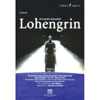Wagner Lohengrin
Modern touches – but this new Lohengrin remains at heart traditional
View record and artist detailsRecord and Artist Details
Composer or Director: Richard Wagner
Genre:
DVD
Label: Opus Arte
Magazine Review Date: 4/2007
Media Format: Digital Versatile Disc
Media Runtime: 279
Mastering:
Stereo
DDD
Catalogue Number: OA0964D

Tracks:
| Composition | Artist Credit |
|---|---|
| Lohengrin |
Richard Wagner, Composer
Berlin Deutsches Symphony Orchestra Hans- Peter König, King Henry, Bass Kent Nagano, Conductor Klaus Florian Vogt, Lohengrin, Tenor Lyon National Opera Chorus Mainz EuropaChor Akademie Richard Wagner, Composer Roman Trekel, Herald, Baritone Solveig Kringelborn, Elsa, Soprano Tom Fox, Telramund, Baritone Waltraud Meier, Ortrud, Mezzo soprano |
Author: Mike Ashman
Like the Parsifal from this theatre with several of the same artists (Opus Arte, 7/05), Nikolaus Lehnhoff’s new Lohengrin is a calculated distillation of both the work’s dramatic contents and its production history. The hand of his old master Wieland Wagner lies beneficially over the outer acts’ terraced ranks of Brabantine courtiers and Saxon soldiers, as it does on the chessboard movements of the principals around a central disc. (The sets here are by the noted German architect Stephan Braunfels, whose recreation of a giant Svoboda staircase for the Act 2 processions is memorable.) The (swan-less) appearance and departure of Lohengrin into a thin, central beam of light recall the imagery of Bayreuth’s recent Keith Warner/Stefanos Lazaridis staging, while the promotion of Elsa to a constantly onstage narrator/dreamer continues an idea of Götz Friedrich’s in an earlier Bayreuth production (EuroArts DVD).
Yet, although Bettina Walter’s costumes are modern-ish – somewhere between Juan Carlos’s ceremonial Spain and a Hollywood Prisoner of Zenda – Lehnhoff’s direction, as always, remains narrative-based and essentially traditional. Only once, in the bridal chamber scene of Act 3 – where Elsa, in the catty words of writer Robert W Gutman, becomes the “first unsuccessful Wagnerite” – does this director allow himself a conceit, showing Lohengrin, Wagner-like, at a reversed keyboard piano, composing and playing the wedding march. It’s a strange and acute image, revealing at a stroke the hero’s narcissistic and chauvinistic self-absorption.
Lehnhoff’s accumulation of images is trenchantly delivered onstage by his two leading ladies, both wide-ranging, attention-holding actresses: Kringelborn in her vocal prime, strong, pure, never forcing; Meier in her vocal Indian summer, strong, impure, sometimes forcing, but always wholly in the service of this sexy, brainy Ortrud. Vogt, in his silver-blue zoot suit, is a charismatic enigma (hence ideal for this role), an apparently super-light voice but one with both stamina and sustaining power. The lower male voices also make their mark: Fox creates sympathy for this Macbeth without a brain; Trekel’s Herald has power and attitude; König is a subtly eponymous, weak liberal Henry. The chorus(es) sound undernourished, acting better than they keep together (in the tricky vocal helter-skelter of Lohengrin’s arrival) with the pit. It sounds like early days for Kent Nagano at maintaining pace and flow through the weighty four-in-a-bar recitative-like passages.
Thomas Grimm gets his cameras in close, leaving the singers to track reactions to solo utterances but missing some crucial interplay. Within a natural sound spectrum, some tweaking has been done to pull out solo lines in ensemble, but the emotions of Lehnhoff’s vision ring true and will give pleasure
Yet, although Bettina Walter’s costumes are modern-ish – somewhere between Juan Carlos’s ceremonial Spain and a Hollywood Prisoner of Zenda – Lehnhoff’s direction, as always, remains narrative-based and essentially traditional. Only once, in the bridal chamber scene of Act 3 – where Elsa, in the catty words of writer Robert W Gutman, becomes the “first unsuccessful Wagnerite” – does this director allow himself a conceit, showing Lohengrin, Wagner-like, at a reversed keyboard piano, composing and playing the wedding march. It’s a strange and acute image, revealing at a stroke the hero’s narcissistic and chauvinistic self-absorption.
Lehnhoff’s accumulation of images is trenchantly delivered onstage by his two leading ladies, both wide-ranging, attention-holding actresses: Kringelborn in her vocal prime, strong, pure, never forcing; Meier in her vocal Indian summer, strong, impure, sometimes forcing, but always wholly in the service of this sexy, brainy Ortrud. Vogt, in his silver-blue zoot suit, is a charismatic enigma (hence ideal for this role), an apparently super-light voice but one with both stamina and sustaining power. The lower male voices also make their mark: Fox creates sympathy for this Macbeth without a brain; Trekel’s Herald has power and attitude; König is a subtly eponymous, weak liberal Henry. The chorus(es) sound undernourished, acting better than they keep together (in the tricky vocal helter-skelter of Lohengrin’s arrival) with the pit. It sounds like early days for Kent Nagano at maintaining pace and flow through the weighty four-in-a-bar recitative-like passages.
Thomas Grimm gets his cameras in close, leaving the singers to track reactions to solo utterances but missing some crucial interplay. Within a natural sound spectrum, some tweaking has been done to pull out solo lines in ensemble, but the emotions of Lehnhoff’s vision ring true and will give pleasure
Discover the world's largest classical music catalogue with Presto Music.

Gramophone Digital Club
- Digital Edition
- Digital Archive
- Reviews Database
- Full website access
From £8.75 / month
Subscribe
Gramophone Full Club
- Print Edition
- Digital Edition
- Digital Archive
- Reviews Database
- Full website access
From £11.00 / month
Subscribe
If you are a library, university or other organisation that would be interested in an institutional subscription to Gramophone please click here for further information.




